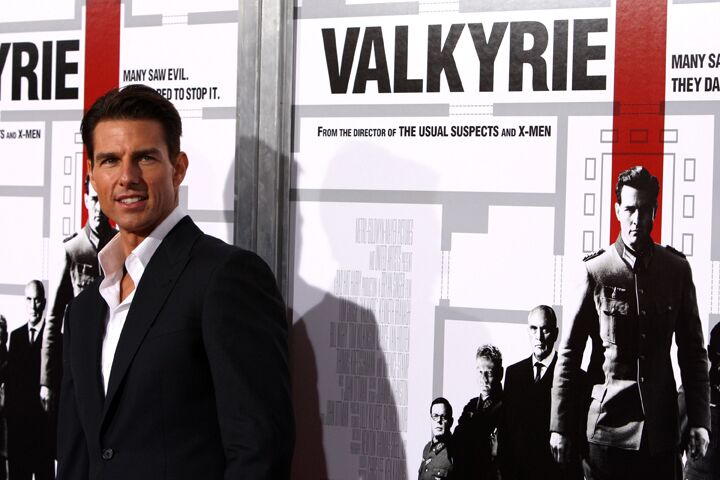
Rewriting Nazi History
The nice Nazi is now in fashion. An article published in the Times on Monday points to a disturbing trend in several newly released movies: the rewriting of Nazi history.
“A specter is haunting Europe,” the article begins. “It wears jackboots, a swastika and a delicate tear-stained expression of angst-ridden introspection. And it’s called the Touchy-Feely Nazi. It can be found in your local multiplex in a quartet of high-profile movies … that take a fresh … new look at the Second World War almost exclusively and often sympathetically from the Nazi point of view. These movies are filled with stars (step forward Tom Cruise and Kate Winslet), they are primed for awards season kudos, and yet they speak of a profound and ultimately queasy shift in the way that we regard National Socialism, the Holocaust and Nazi Germany on-screen.”
One of the biggest of these is Valkyrie, starring Tom Cruise as Col. Claus von Stauffenberg, the leader of a failed plot to assassinate Hitler. In the film, says the Times, “He’s a man of action and nobility who is surrounded by a cast of equally honest souls …. In fact, with the exception of Hitler himself, and a few surrounding cronies, it’s hard to find a nasty Nazi among them.”
The Reader stars Kate Winslet as a German tram conductor who becomes a concentration camp guard. The Boy in the Striped Pajamas tells the story of the family of a sympathetic camp commandant, and a film called Good, yet to be released, is about a sympathetic SS member.
As well as being about Nazis, all these films have something else in common, according to the Times:
What these films share is a common revisionist tone, and an urge to be taken seriously as morally mature storytelling. Indeed they were collectively applauded last month in Newsweek magazine for being “remarkable” and “more than black and white,” and for refusing to take an unambiguous stance on the ideological perils of living in Nazi Germany. “Look,” these movies seem to say, “being a Nazi wasn’t that easy, and furthermore not everybody caught the bug.” Bryan Singer, the director of Valkyrie, was even more explicit when he announced recently: “Nobody wants to believe that all of a people are indoctrinated into evil, into murder and such hate. Nobody wants to believe that. So I think Valkyrie will be inspiring to people. I hope it will.”
These films embrace a dangerous fiction. The idea that only a few evil men hijacked a nation is simply not true, says Richard Evans, regius professor of modern history at Cambridge University and the author of a definitive Third Reich historical series. “There is a tendency, perhaps derived from the sources that filmmakers use for these films, to show everyone as being very rational and reasonable,” said Evans. “Whereas only Hitler and just a few people around him—the top-level Nazis—are seen as absolute raving maniacs. And the fact is that Nazi ideology did go fairly wide and deep.”
Evans pointed out how the movies had to bend the truth to make it fit their brand of revisionist history. “Von Stauffenberg,” writes the Times, “though clearly an icon to Cruise, had characteristics that would have made him wildly unpalatable to a modern audience, namely he was an anti-Semite and someone who held, ‘a mystical belief in an eternal sacred Germany.’ However, the von Stauffenberg whom we meet on film is unquestionably heroic, and someone who meets his martyr’s end with near Christ-like dignity.” Filmmakers re-wrote history for the other movies too. “The child protagonist in The Boy in the Striped Pajamas, for instance,” says the Times, “would have been well-versed in Nazi ideology and not the innocent that he was on screen.”
The sad truth is that Hitler did not finagle his way to power and force a reluctant nation to hate the Jews and want to take over the world. Both of these beliefs were already present within Germany. The historian Paul Johnson details this in his book Modern Times. He writes that even during the 1920s, and before,
There were proposals for double-taxation for Jews; isolation or apartheid; a return to the ghetto system; special laws, with hanging for Jews who broke them; an absolute prohibition of inter-marriage between Aryan Germans and Jews …. Calls for the extermination of the Jews became frequent and popular, and anti-Semitic pamphlets circulated in millions. There were many violent incidents, but when, in 1919, the Bavarian police asked for advice on how to cope with anti-Semitism, Berlin replied there was no remedy since “it has its roots in the difference of race which divides the Israelitic tribe from our Volk.”
These recent films portray the rise of Nazism as a one-off, unfortunate affair caused by one man in the wrong place at the wrong time. In reality, the rise of Nazism contains a vital lesson for everyone in the world. It shows what human beings are really capable of, and how easily mankind can be motivated toward hate. Nobody wants to believe it, as Valkyrie’s director said. But that doesn’t stop it from being the truth.
The leaders of the Allied nations said in a February 1945 document: “It is our inflexible purpose to destroy German militarism and Nazism and to ensure Germany will never again be able to disturb the peace of the world.” They saw that there was a problem there. Germany had repeatedly launched aggressive wars of expansion. They wanted to make sure it would never happen again.
How is it possible to learn from this history if we change the story of what actually happened? World Wars i and ii contain vital lessons that everyone in the world should take note of. For these lessons from history, and others, read our booklet Germany and the Holy Roman Empire.
